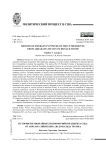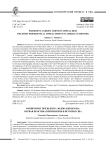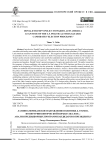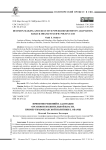Политический процесс в США. Рубрика в журнале - Вестник ВолГУ. Серия: История. Регионоведение. Международные отношения

History of emergency powers of the US presidents: from Abraham Lincoln to Donald Trump
Статья научная
Introduction. In the context of the COVID-19 pandemic announced by the WHO in 2020, American researchers bring up the question of the legitimacy, adequacy, or, on the contrary, redundancy of measures taken by the US leadership to protect the population. The study of the US President’s history of emergency powers can demonstrate how previous American Presidents managed to preserve or, conversely, subvert the established liberal foundations of American society in emergency situations. Methods and materials. The author used methods of structural analysis and synthesis, historical and legal comparative method, formal legal method, and method of legal modeling. Analysis. The author studied A. Lincoln’s extra-constitutional authority to emancipate slaves, suspend the Habeas Corpus Act, create a volunteer army, and declare a naval blockade. On the basis of legal sources, we carried out the analysis of F. Roosevelt’s decisions on the creation of courts-martial and the internment of people of Japanese descent; reviewed the activities of G. Bush after the September 11 attacks and D. Trump’s emergency measures related to building the border wall in the south of the USA. Results. During the research, we found, that each military, economic, or social crisis increased the political significance and role of the executive branch in emergencies. We can characterize the increase of the emergency powers, delegated to the US Presidents, as steadily growing due to the crises that took place in various periods of American history. It was proved, that the precedents of emergency measures created by A. Lincoln, F. Roosevelt and George W. Bush had a long-term impact on the actions of the next US Presidents, opening up new legal opportunities for the use of emergency powers. At the same time, Congress and the US Supreme Court have taken a controversial stance on the validity of the President’s actions at various historical stages. Most of the time, the status of the legislative and judicial branches of government, as well as the understanding of “emergency situation” itself depended on the specific case and practical political needs
Бесплатно

President Andrew Johnson impeached: the first presidential impeachment in American history
Статья научная
Introduction. The article is devoted to the mechanism of impeachment procedure on the example of the first practical application of it in the history of the U.S. in relation to President Andrew Johnson. This created a necessary precedent in the further political struggle between the branches of government and has made the study of the history of the first presidential impeachment an urgent problem. Impeachment cases were brought against six subsequent presidents: Cleveland, Hoover, Truman, Nixon, Reagan, and G.W. Bush in the lower house of Congress. W. Clinton and D. Trump’s impeachment was discussed in the Senate, but was not successful. Methods and materials. The article is based on materials from the American press as well as cartoons. The novelty of the source base is in combination of verbal and visual materials. The author used theoretical concepts developed within the framework of interdisciplinarity. The problem-chronological approach was the methodological basis of the research. In American historiography, Johnson is regarded as the “worst” President in U.S. history. However, the debate over the legitimacy of the first impeachment of a President in U.S. history has not subsided until now. In American studies, the impeachment of Andrew Johnson has not been specifically considered. Analysis. The conflict between the President and Congress was caused by the Reconstruction policy. The confrontation between the two branches of government led to impeachment. The President was charged in connection with the dismissal of Secretary of War E. Stanton, which was a violation of the Tenure of Office Act. The article examines how the impeachment procedure was implemented by Congress and why it failed. Results. Despite the failure, the first impeachment of a President in the history of the United States showed the effectiveness of the “checks” and “balances” mechanism in implementing the principle of separation of powers. It has become a deterrent to the relationship between the President and Congress.
Бесплатно

Статья научная
Введение. Политика администрации Д. Трампа в отношении латиноамериканского региона и нелегальных мигрантов-латинос часто вызывала критику со стороны СМИ. Многие эксперты признают, что за четыре года президентства Д. Трампа сотрудничество США со странами Латинской Америки было сильно подорвано. Такая негативная тенденция должна была стать предметом обсуждения кандидатов на президентские выборы в США 2020 года. Цель статьи – выяснить, какие аспекты латиноамериканской политики администрации Д. Трампа использовались кандидатами на пост президента в их предвыборных заявлениях, за что критиковали и за что хвалили американского президента. Методы и материалы. Исследование построено на анализе предвыборных программ и речей кандидатов на пост президента, а также ежегодных посланий Д. Трампа Конгрессу. Рассматривались как вышедшие в финал кандидаты, так и наиболее популярные в начале 2020 г., но проигравшие праймериз. Помимо общенаучных методов исследования в работе используются методы дискурс-анализа и компаративного анализа. Анализ. Практически все кандидаты в той или иной степени критиковали политику Д. Трампа. Критике подверглись подходы президента к Мексике, Кубе и Венесуэле, к решению вопросов нелегальной иммиграции. Явного одобрения политика Д. Трампа не получила не от одного кандидата. Из всех претендентов на пост президента США только Дж. Байден предложил более-менее разработанный план по налаживанию отношений со странами Центральной Америки. Результаты. Исследование показало, что критику Д. Трампа вызывало не само латиноамериканское направление его политики, а лишь методы, которые он использовал в достижении своих целей. Большая часть региона Латинская Америка вообще выпала из внешнеполитического дискурса США, никак не была представлена в программах, речах и выступлениях. Это говорит о том, что реальные сдвиги в латиноамериканском направлении внешней политики США в ближайшие годы не произойдут.
Бесплатно

Принятие решений и адаптация органов исполнительной власти. Пример тихоокеанской политики Б. Обамы
Статья научная
В процессе разработки политики в отношении АТР в администрации и правительстве Б. Обамы определяющую роль играли не общие политические установки, а характер взаимодействия между сотрудниками органов исполнительной власти. С использованием структурного метода, истории повседневности и адаптологии в статье проанализированы скрытые стороны процесса принятия решений, которые нашли отражение в официальном нарративе. Ключевыми центрами, вовлеченными в борьбу за разработку курса, были президент и его администрация, Госдепартамент, Министерство обороны, представитель США на торговых переговорах. Вследствие высокой конкуренции между ними и стремлением отстаивать интересы своего ведомства процесс принятия решений приобрел некоторые особенности. Чтобы обозначить свою позицию и ослабить влияние конкурентов, ведомства разрабатывали не только свои стратегии, но и создавали связанные с ними концепции и нарративы, открывали новые рабочие места для их обслуживания, маскировали свое реальное отношение друг к другу, равно как и истинные цели своих ведомств, предлагали новые формы взаимодействия с негосударственными акторами. Чтобы предотвратить усиление других центров принятия решений, Б. Обама и его советники разработали концепцию «перебалансировки». Ответным шагом Х. Клинтон стала концепция «кардинального поворота». Министерство обороны в условиях борьбы этих нарративов вынужденно встало на сторону президента, замаскировав тем самым свои истинные цели. Торговый представитель США Р. Крик уклонился от этого противостояния и сконцентрировался на адаптации к объективным условиям. Следствием этой межведомственной борьбы стало отсутствие единой региональной стратегии, основанной на общих целях, задачах и понимании региона.
Бесплатно

